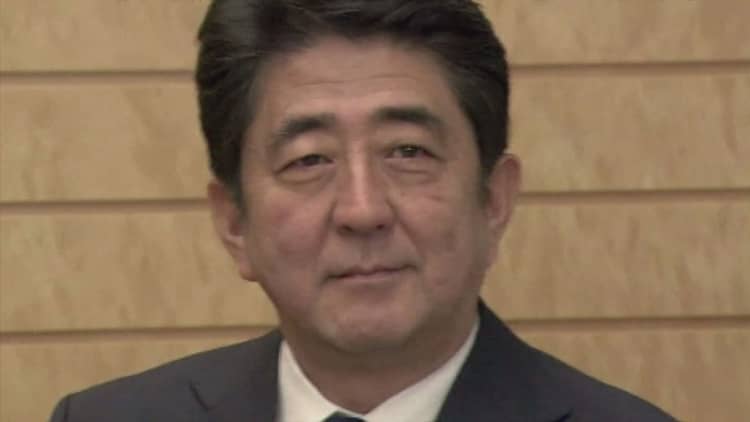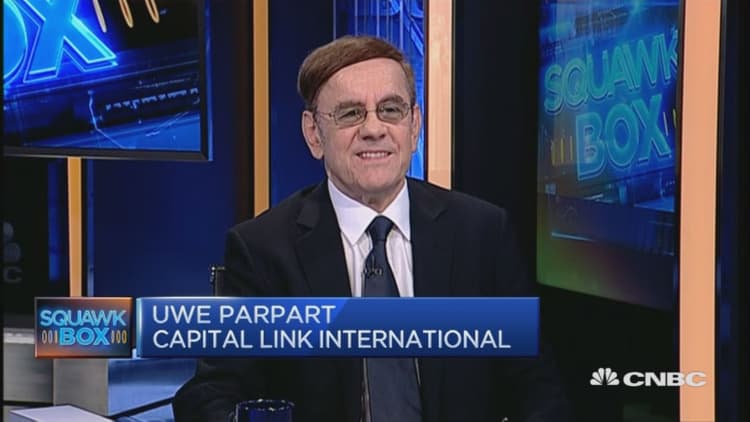
May is a crucial month for the world's third-largest economy, with three key risk events on the calendar that could sway investor confidence.
Within the month, Prime Minister Shinzo Abe is expected to make a decision on a consumption tax hike scheduled for April 2017, unleash a slew of fiscal policies linked to his "Abenomics 2.0" program and host the Group of Seven (G7) Leaders' Summit.
"We expect clarity on all three issues in the coming weeks," Izumi Devalier, HSBC economist, said.
All this takes place against the backdrop of a shaky economic recovery and jittery financial markets.
Abe's four-year quest to end Japan's near 20-year deflationary history has hit some new speed bumps; In March, consumer prices dropped 0.3 percent on-year, their fastest pace in three years, while household spending fell an annual 5.3 percent to a one-year low.
Meanwhile, the yen has strengthened 9 percent against the dollar since the Bank of Japan (BOJ) introduced negative interest rates at the end of January, according to DBS. A stronger currency tends to shave off repatriated earnings for export-centric companies and can result in lower capital investment. On Tuesday, the yen was trading at 109 per dollar.
To tax or not to tax
Local media reported at the weekend that Abe would delay an increase in the current consumption levy, also known as sales tax, from 8 to 10 percent next year on the back of tepid inflation. Speaking in parliament on Tuesday, the 61-year old said he would decide on the matter "appropriately at the appropriate time."
An increase in the tax, while crucial for paring the nation's bulging debt pile, risks worsening the nation's economic health, economists have warned, and Abe has already postponed hiking the tax once, in October. A sales tax increase in April 2014, which raised the levy from 5 percent to 8 percent, plunged the economy into a two-quarter recession in 2014.
"I think they [the government] will back down again," Ray Attrill, National Australia Bank's FX strategy co-head, said, adding that officials were likely to announce the delay after the G7 Summit—a view that HSBC's Devalier shared.
"The Japanese consumer isn't going to continue to spend in the face of a higher tax. You may get some frontloading...but as we saw in the previous leg, there was a real downturn in consumption [following the levy hike]," Attrill said.

Devalier pointed to a recent Nikkei survey that showed only 14 percent of Japanese bond investors expected the 2017 hike to go ahead as scheduled.
Economic considerations aside, politics will also play a factor in Abe's decision.
With upper and lower house elections scheduled in June and July, a delay in the tax could help the ruling Liberal Democratic Party (LDP)'s chances, explained Uwe Parpart, chief strategist at Capital Link International.
Abenomics 2.0
Last year, Abe updated his signature economic platform to "Abenomics 2.0," a move widely read as a sign of recognition that previous policies weren't working.
The three arrows of Abenomics 1.0—high public spending, aggressive monetary easing and structural reforms—were replaced under the 2.0 plan with a focus on a strong economy, improved social security and better support for child care.
"By the end of this month, the government is expected to announce detailed economic measures designed to help realize these and other policy targets," Devalier explained. "The measures are expected to be a mix of stimulus (i.e. shopping vouchers to stimulate household consumption, public works projects) and de-regulation."
Specific policy targets could include raising Japan's nominal gross domestic product (GDP) to 600 trillion yen ($5.4 trillion), from 500 trillion yen currently, by the 2020 fiscal year, and increasing the birth rate to 1.8 children per woman, from 1.42 currently, she said.
"The idea of any fiscal stimulus plan that will be effectively financed by the BOJ should unfold in the coming month or so, [and] that has some potential to weaken the yen," echoed Attrill, who expects news of the plan to be announced following the G7 meeting.
All eyes on G7
Japan last hosted a G7 summit eight years ago and amid mixed data points, Abe's administration will likely use the two-day conference as a springboard to deliver a strong policy response and pacify worries of the international community about Japan's direction.
"The urgency is high. Preliminary estimates of first quarter GDP (due this Wednesday) will likely show that the economy barely expanded, weighed down by still-weak domestic demand," Devalier said.
"Meanwhile, there is a growing sense that BOJ easing is running into diminishing returns. As a result, the government is facing increasing pressure to do more of the heavy lifting to support growth," noted Devalier, a reference to the BOJ's move to cut deposit rates into negative territory that critics say has failed to boost inflation and growth.
The recent rally in the local currency could also be on the agenda at this year's summit.
"There's a concern that the Japanese contingent might ask for permission to take measures that would allow the yen to weaken back to the 120 level prior to negative interest rates," said Attrill.
Finance Minister Taro Aso and other policymakers have repeatedly said that a one-off intervention in response to "one-sided currency moves" wouldn't breach a Group of 20 agreement to avoid competitive currency devaluations.
But U.S. Treasury Secretary Jack Lew has pushed back, describing forex markets as "orderly" and warning that devaluations risked setting off a currency warn. Lew said as recently as May 13 that he wanted G7 attendees to reiterate their commitments against exchange rate devaluations, according to reports.


